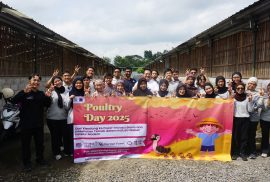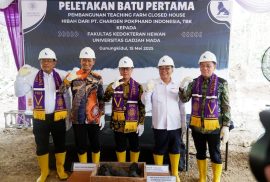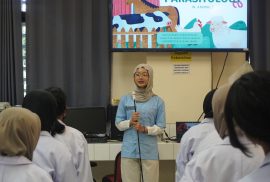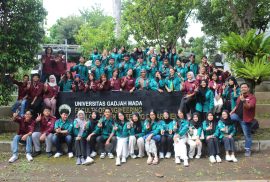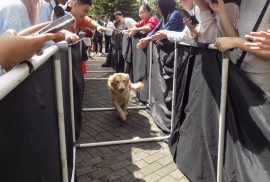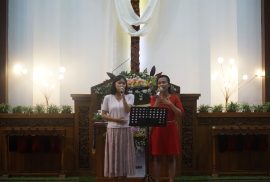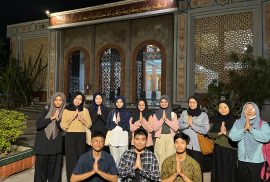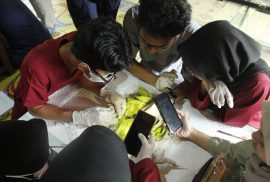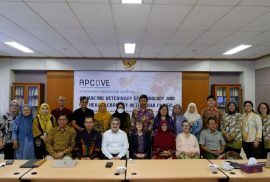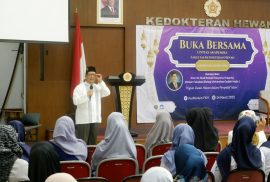Poultry Day of the Productive Livestock Study Association (Himpunan Studi Ternak Produktif) 2025 is a work program organized by the Poultry Division of HSTP FKH UGM.
SDG 4: Quality Education
FoVM UGM is the first university to receive a Grant for the Modern Closed House Layer from PT. Charoen Pokphand Indonesia
On Sunday, May 4, 2025, the Productive Animal Husbandry Study Association (HSTP) of the Faculty of Veterinary Medicine, Universitas Gadjah Mada, successfully held the “HSTP Bergerak” event with the theme “Vet Camp: A Day in the Life of a Veterinarian, Veterinarian in Action.” This event was attended by 84 participants from various high schools in Yogyakarta and surrounding areas.
On Saturday, May 3, 2025, a Study Visit to Faculty of Engineering UGM was held at the Department of Geological Engineering UGM by the Veterinary Science Club (VSC) Network Department of Faculty of Veterinary Medicine UGM together with American Association of Petroleum Geologists (AAPG) FT UGM. The Study Visit itself is an annual work program carried out to expand the relationship of VSC members not only within the scope of the faculty but also throughout UGM area.
“Easter Special” Dog Run is a collaborative activity between the Pet Study Group (KSHK) of the Faculty of Veterinary Medicine, Universitas Gadjah Mada and the Dog Run Community located in Yogyakarta.
The Easter Worship and Celebration is an annual event held at Universitas Gadjah Mada. In 2025, the Christian Student Fellowship (PMK) of the Faculty of Veterinary Medicine (FVM) UGM also organized its own Easter Worship and Celebration. This event took place on April 26, 2025 from 04.00 to 07.40 PM at GKJ Samirono Baru.
On March 19 -23, 2025, the Veterinary Muslim Student Family (KMMV) of the Faculty of Veterinary Medicine UGM held Ramadan in the Faculty (RDF) event. This activity was held offline at the An-Nahl mosque of the Faculty of Veterinary Medicine.
In Saturday, 20 April 2025 at Mini Zoo Jogja Exotarium, Sleman, Yogyakarta, Wildlife Study Group (KSSL) Faculty of Veterinary Medicine UGM held an event called Pisces or Marine Mammals Basic Medicine with the theme of Understanding the Ecology of Arapaima and Parrot Fish.
The Faculty of Veterinary Medicine (FKH), Universitas Gadjah Mada (UGM), is collaborating with the University of Sydney, Australia, as the lead institution in the Strengthening Veterinary Workforce in Asia-Pacific for Diseases Detection and Response (Vet-APIDDaR) project, funded by the Australian Department of Foreign Affairs and Trade (DFAT).
The event was attended by lecturers, education staff, and student representatives. In addition, FVM UGM also invited =&0=&to give a homily about getting to know animal world through Islamic perspective in which he explained about the creation of nature, genetics, and bioacoustics.
The event was started by a speech from the Head of the Administration Office, Triyanto S. H. He expressed his gratitude to the lecturers, education staff, and student representatives who had attended this activity and for the committee who had arranged the agenda. Furthermore, he explained that a series of activities in the month of Ramadhan 1446 H at the Faculty of Veterinary Medicine UGM including: Tadarus (reciting) Al Qur’an (30 minutes before office hours start and during break time), distributing Alms Boxes in each Department and work unit. Later on, the amount from the boxes will be distributed to Contract workers and Outsourced workers. He also said that this event began with the

